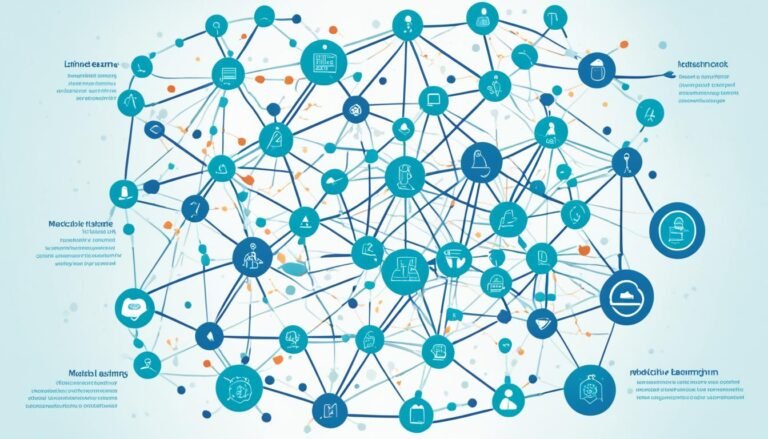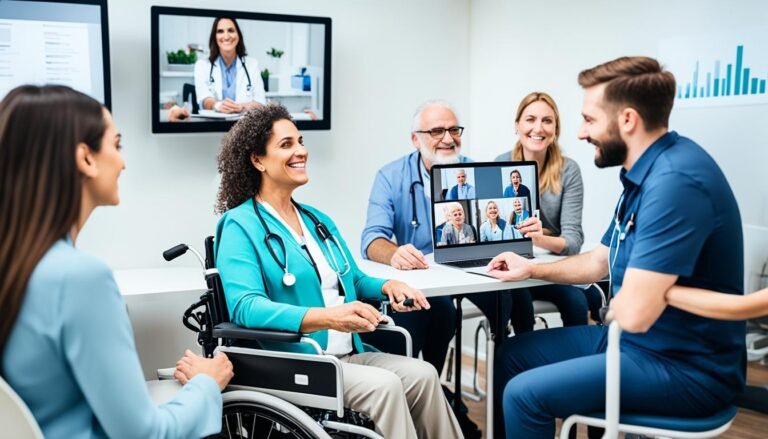The Role of Health Apps in Patient Education and Empowerment
In the ever-evolving landscape of healthcare, patients seek to navigate a complex web of information to make informed decisions about their well-being. Like a guiding light in the darkness, health apps have emerged as a powerful tool in patient education and empowerment.
These digital companions provide personalized health information, facilitate communication with healthcare providers, and enhance self-management skills. By harnessing the power of data and fostering patient engagement, health apps hold the potential to revolutionize the way patients navigate their healthcare journeys.
Key Takeaways
- Health apps provide accessible and interactive educational resources for patients.
- Personalized health information and remote patient monitoring capabilities empower patients to actively participate in their own care and make informed decisions.
- Health apps improve patient engagement and self-management skills, leading to better health outcomes.
- Improved communication facilitated by health apps enhances patient-provider communication and promotes seamless healthcare information exchange.
Increasing Health Literacy Through Health Apps
By providing accessible and interactive educational resources, health apps play a crucial role in increasing health literacy among patients. Health literacy refers to an individual’s ability to obtain, understand, and apply health information to make informed decisions about their health and healthcare.
With the rapid advancements in technology and the increasing use of smartphones, health apps have emerged as a valuable tool in empowering patients and enhancing their understanding of health-related information.
Health apps offer a wide range of features that contribute to increasing health literacy. These apps provide easily accessible information on various health topics, including symptoms, diseases, medications, and treatment options. They also offer interactive features such as videos, animations, and quizzes that engage patients and facilitate their understanding of medical concepts. Furthermore, health apps often incorporate personalized features, such as tracking tools for monitoring vital signs, medication reminders, and appointment scheduling. These features not only empower patients to take control of their health but also enable them to actively participate in their healthcare decisions.
The increased health literacy facilitated by health apps leads to several benefits for patients. Firstly, it enables patients to make more informed decisions about their health, understand their medical conditions, and adhere to treatment plans. This, in turn, improves health outcomes and reduces healthcare costs. Secondly, health literacy empowers patients to communicate effectively with healthcare providers, ensuring a collaborative and patient-centered approach to healthcare. Additionally, increased health literacy can lead to improved self-management skills, enabling patients to practice preventive measures and adopt healthier lifestyles.
Empowering Patients With Personalized Health Information
The provision of personalized health information, along with the use of health apps, empowers patients to take control of their own healthcare decisions. By tailoring information to individual needs, patients can better understand their health conditions, treatment options, and potential risks. This personalized approach enhances patient engagement and empowers them to actively participate in their own care.
Here are a few ways in which personalized health information can empower patients:
-
Access to personalized treatment options: By providing patients with information about various treatment options specific to their condition, health apps enable them to make informed decisions about their care. This empowers patients to choose the treatment that aligns with their goals, preferences, and values.
-
Remote patient monitoring: Health apps equipped with remote monitoring capabilities allow patients to track their health parameters, such as blood pressure, blood sugar levels, or heart rate, from the comfort of their homes. This real-time data empowers patients to actively manage their conditions and make necessary adjustments to their treatment plans.
-
Improved communication with healthcare providers: Personalized health information facilitates more effective communication between patients and healthcare providers. Patients can share their health data and treatment preferences with their providers, allowing for a collaborative approach to decision-making.
-
Enhanced self-management: With personalized health information, patients can access educational resources, self-care tips, and reminders specific to their condition. This empowers patients to take ownership of their health and engage in proactive self-management.
Through the provision of personalized health information, health apps empower patients to become active participants in their healthcare journey. By understanding their conditions and treatment options, patients can make informed decisions, effectively communicate with their healthcare providers, and take charge of their own well-being.
Enhancing Self-Management Skills Through Health Apps
Enhancing self-management skills through health apps is crucial for improving patient engagement and promoting personalized health interventions.
By providing patients with easy access to their health information and tools for tracking and managing their conditions, these apps empower individuals to take an active role in their own healthcare.
This not only enhances their self-management skills but also fosters a sense of ownership and control over their well-being.
Improving Patient Engagement
Health apps play a crucial role in improving patient engagement by facilitating the enhancement of self-management skills. These apps empower patients by providing them with the necessary tools and resources to take control of their own health and well-being. By using these apps, patients can access educational materials, track their symptoms, monitor their medication intake, and communicate with healthcare professionals. This increased engagement leads to better patient outcomes and improved self-care.
Patients can set reminders for medication and appointments, ensuring they stay on track with their treatment plan.
Apps provide personalized health information and resources, empowering patients to make informed decisions about their care.
Patients can track their progress and set goals, giving them a sense of achievement and motivation to continue their self-management efforts.
Apps allow for easy communication and collaboration between patients and healthcare professionals, fostering a partnership in the patient’s care.
Personalized Health Interventions
Personalized health interventions aim to empower patients and enhance their self-management skills through the use of health apps. These interventions provide personalized treatment plans and health coaching to help individuals take control of their own health and well-being. Health apps play a crucial role in delivering these interventions by providing users with tailored information, reminders, and tools to monitor their health conditions and track progress.
To illustrate the effectiveness of personalized health interventions through health apps, consider the following table:
| Benefits of Personalized Health Interventions |
|---|
| 1. Improved patient engagement and empowerment |
| 2. Enhanced self-management skills |
| 3. Increased adherence to treatment plans |
| 4. Better health outcomes |
Through personalized treatment plans and ongoing health coaching, patients can become active participants in their own care, leading to better self-management of their conditions and improved overall health outcomes. Health apps provide a convenient and accessible platform for patients to receive personalized guidance and support, enabling them to make informed decisions about their health.
Facilitating Communication Between Patients and Healthcare Providers
Facilitating communication between patients and healthcare providers is a crucial aspect of patient education and empowerment. Health apps play a significant role in improving patient-provider communication by providing a platform for easy and convenient interaction.
These apps also enhance healthcare information exchange, allowing patients to access and share their health records, test results, and other relevant data with their healthcare providers, leading to more informed and personalized care.
Improved Patient-Provider Communication
By promoting seamless information exchange, health apps enhance communication between patients and healthcare providers. This improved patient-provider communication has several benefits, including increased patient satisfaction and better telemedicine integration.
Patients feel more involved in their healthcare decisions, leading to increased satisfaction and trust in their healthcare providers.
Health apps allow patients to easily share their health data with their healthcare providers, enabling more accurate diagnoses and treatment plans.
Real-time messaging features in health apps facilitate quick and convenient communication between patients and healthcare providers, reducing the need for in-person visits and improving access to care.
Health apps also enable healthcare providers to securely share educational materials, test results, and treatment plans with their patients, empowering them to take an active role in managing their health.
Enhanced Healthcare Information Exchange
Improving the exchange of healthcare information between patients and healthcare providers can be facilitated through the use of health apps. These apps provide a platform for patients to access and share their health information with their healthcare providers, leading to increased patient empowerment and improved health outcomes.
Health apps enable patients to easily track and monitor their health conditions, such as blood pressure, blood glucose levels, and medication adherence. By regularly inputting this information into the app, patients can provide accurate and up-to-date data to their healthcare providers. This allows healthcare providers to have a comprehensive view of the patient’s health status, enabling them to make more informed decisions regarding treatment options.
Furthermore, health apps often include features that allow for secure messaging between patients and healthcare providers. This enhances communication and enables patients to ask questions, seek clarification, or provide updates on their health without the need for an in-person visit. This increased communication can lead to better patient understanding, improved adherence to treatment plans, and ultimately, improved health outcomes.
Improving Medication Adherence With Health Apps
Enhancing medication adherence through the utilization of health apps is becoming increasingly important in patient care. With the rise of chronic diseases and complex medication regimens, patients often struggle to comply with their prescribed treatments. Health apps offer a promising solution by providing medication management tools that help patients stay on track with their medications.
Here are some ways that health apps can improve medication adherence:
-
Customized Reminders: Health apps can send personalized reminders to patients, ensuring they take their medications at the right time. This feature helps to reduce forgetfulness and promotes consistency in medication intake.
-
Educational Resources: Many health apps provide educational resources about medications, including information on dosage, side effects, and potential drug interactions. By empowering patients with knowledge, they can make informed decisions about their treatment and adhere to their prescribed medication regimen.
-
Tracking and Monitoring: Health apps allow patients to track their medication intake and monitor their progress. This feature helps patients visualize their adherence and motivates them to stay consistent with their treatment.
-
Communication with Healthcare Providers: Some health apps facilitate communication between patients and healthcare providers. This feature allows patients to share information about their medication adherence and seek guidance or support when needed.
Promoting Healthy Lifestyle Choices Through Health Apps
Promoting healthy lifestyle choices through health apps can be achieved through personalized health recommendations, tracking progress and goals, and access to reliable information.
These apps can provide tailored suggestions based on an individual’s specific needs and preferences, helping them make informed decisions about their health.
Additionally, tracking features allow users to monitor their progress and set achievable goals, encouraging accountability and motivation.
Lastly, the availability of reliable information within health apps ensures that users have access to accurate and up-to-date knowledge, empowering them to make informed choices about their lifestyle.
Personalized Health Recommendations
With the increasing popularity of health apps, individuals can now receive personalized health recommendations to support and guide their healthy lifestyle choices. These apps utilize personalized health monitoring and data analysis to provide users with tailored recommendations based on their specific needs and goals.
Here are some ways in which personalized health recommendations through health apps can empower individuals:
-
Customized exercise plans: Health apps can generate personalized workout routines based on an individual’s fitness level, goals, and preferences, helping them stay motivated and achieve optimal results.
-
Nutritional guidance: These apps can offer personalized dietary recommendations, taking into account an individual’s health conditions, allergies, and dietary preferences, promoting a balanced and healthy diet.
-
Sleep optimization: Health apps can provide personalized sleep recommendations, helping individuals improve their sleep quality and establish healthy sleep patterns.
-
Stress management techniques: These apps can offer personalized stress reduction strategies, such as mindfulness exercises and breathing techniques, helping individuals manage stress and promote overall well-being.
Tracking Progress and Goals
Health apps allow individuals to monitor their progress and goals, facilitating the promotion of healthy lifestyle choices. These apps provide a platform for goal setting and progress tracking, empowering users to take control of their health and well-being. By setting specific goals, individuals can establish targets for various aspects of their health, such as weight loss, exercise frequency, or water intake. The progress tracking feature enables users to monitor their daily activities, track their progress over time, and make necessary adjustments to achieve their goals. This visual representation of their progress can be motivating and encourage individuals to maintain healthy habits. Below is a table showcasing how health apps can assist in tracking progress and goals:
| Goal Setting | Progress Tracking |
|---|---|
| Set specific health goals | Track daily activities and habits |
| Establish targets for weight, exercise, etc. | Monitor progress over time |
| Adjust goals as needed | Visual representation of progress |
| Motivate and encourage healthy habits | Maintain accountability and motivation |
| Personalize goals based on individual needs | Make informed decisions for lifestyle changes |
Access to Reliable Information
Accessing reliable information through health apps can significantly enhance individuals’ ability to make informed and healthy lifestyle choices. Health apps provide a convenient platform for users to access a wide range of information related to their health and well-being. By offering reliable sources and credible information, these apps empower users to take control of their health and make informed decisions.
The accessibility of information through health apps allows individuals to stay updated on the latest medical research, understand their health conditions, and learn about various treatment options. This promotes a sense of empowerment and encourages individuals to actively participate in their own healthcare.
Here are four emotional benefits of accessing reliable information through health apps:
- Peace of mind knowing that the information received is accurate and trustworthy.
- Confidence to make informed decisions about one’s health and well-being.
- Empowerment to take control of one’s health and actively participate in healthcare decisions.
- Motivation to make healthier lifestyle choices based on reliable and evidence-based information.
Harnessing the Power of Data for Patient Education
The utilization of comprehensive patient data can greatly enhance the effectiveness of educational interventions in healthcare. By harnessing the power of data, healthcare providers can gain valuable insights into patient needs, preferences, and behaviors. This knowledge allows for the development of personalized educational materials and interventions that are tailored to individual patients, improving their understanding and engagement with their own health.
However, it is crucial to address concerns regarding data privacy and user experience when utilizing patient data for educational purposes. Patients must feel confident that their personal information is being protected and used ethically. Healthcare organizations must adhere to strict data privacy regulations and ensure that patient data is stored securely and anonymized when used for educational purposes.
In addition to data privacy, user experience also plays a crucial role in the effectiveness of educational interventions. Health apps and platforms must be user-friendly, intuitive, and accessible to all patients. They should provide clear and concise information, interactive features, and personalized recommendations to enhance the learning experience.
Furthermore, the utilization of patient data for educational purposes should be transparent and patients should have control over their own data. This includes providing patients with the option to opt-out of data sharing and ensuring that they are aware of how their data is being used.
Overcoming Barriers to Accessing Healthcare Information
To effectively empower patients with healthcare information, it is important to identify and address barriers that hinder their access to such information. Improving healthcare access and bridging the information gap are crucial steps towards ensuring that patients are well-informed about their health and can actively participate in their care.
Here are some of the barriers that need to be overcome:
-
Limited availability of healthcare resources: In many regions, there is a shortage of healthcare providers and facilities, making it difficult for patients to access timely and accurate information.
-
Language and cultural barriers: Language differences and cultural practices can pose challenges in understanding and accessing healthcare information, particularly for individuals from diverse backgrounds.
-
Socioeconomic disparities: Economic factors can limit individuals’ ability to afford healthcare services and access information. This can lead to a lack of awareness about available resources and preventive measures.
-
Digital divide: Not everyone has access to technology or the internet, which can hinder their ability to access online healthcare information and resources.
Efforts should be made to address these barriers by ensuring equitable access to healthcare services and information. This can be achieved through targeted interventions such as community health programs, multilingual resources, and improved technology infrastructure.
Fostering Patient Engagement and Active Participation
During the healthcare journey, patients must be actively engaged and participate in their care to achieve optimal health outcomes. Patient empowerment and healthcare education play a crucial role in fostering patient engagement and active participation. With the advent of health apps, patients now have access to a wealth of information and tools that can empower them to take charge of their health.
Health apps provide patients with educational resources and interactive features that allow them to learn about their conditions, treatment options, and self-care strategies. These apps can deliver personalized content, such as videos, articles, and quizzes, to educate patients about their specific health needs. By empowering patients with knowledge, health apps enable them to make informed decisions about their care and take an active role in managing their health.
Furthermore, health apps offer features that encourage patients to actively participate in their healthcare. For instance, these apps can provide reminders for medication adherence, track symptoms and vital signs, and facilitate communication with healthcare providers. By incorporating these features into their daily routines, patients become more engaged in self-monitoring and can share accurate data with their healthcare team, leading to better treatment outcomes.
Strengthening Patient Advocacy Through Health Apps
Health apps frequently enhance patient advocacy by empowering individuals to actively participate in their healthcare decisions and voice their needs. With the increasing popularity of digital healthcare, patients now have access to a wide range of tools and resources that can help them become more informed and engaged in their own care. Here are some ways in which health apps strengthen patient advocacy:
-
Personalized education: Health apps provide patients with personalized educational materials, such as articles, videos, and interactive tools, that can help them understand their condition better and make informed decisions about their treatment options. This empowers patients to take an active role in their healthcare journey.
-
Communication and collaboration: Many health apps offer features that allow patients to communicate with their healthcare providers, ask questions, and share updates about their health. This fosters a collaborative relationship between patients and providers, where patients can advocate for their needs and preferences.
-
Access to support networks: Health apps often include features that connect patients with support networks, such as online communities and peer-to-peer forums. These platforms allow patients to share their experiences, seek advice, and find emotional support from others who are going through similar health challenges.
-
Health data tracking: Health apps enable patients to track their health data, such as symptoms, medications, and vital signs. This data can be shared with healthcare providers, facilitating more meaningful discussions and enabling patients to advocate for the care they need.
Conclusion
In conclusion, health apps play a pivotal role in patient education and empowerment.
By increasing health literacy, providing personalized health information, enhancing self-management skills, and facilitating communication, these apps foster patient engagement, active participation, and advocacy.
They also improve medication adherence, harness the power of data, and overcome barriers to accessing healthcare information.
As a figure of speech, health apps serve as a compass, guiding patients towards a path of knowledge, empowerment, and improved healthcare outcomes.

Our Healthcare Editorial Team is composed of subject matter experts and seasoned healthcare consultants who bring decades of combined experience and a wealth of academic qualifications. With advanced degrees and certifications in various medical and healthcare management fields, they are dedicated to supporting the personal and career development of healthcare professionals. Their expertise spans clinical practice, healthcare policy, patient advocacy, and public health, allowing us to offer insightful, well-researched content that enhances professional growth and informs practice.
Disclaimer
The client education section of our blog is intended to support healthcare providers by offering informational resources for patient education. However, this information is not meant to serve as medical advice. We advise healthcare professionals to ensure all content is consistent with their clinical knowledge and confirm with current medical standards before using it in their practice or advising patients. For specific medical issues, always refer to professional guidance and standards of care.
For any legal matters or specific medical concerns, we strongly recommend consulting with a qualified legal professional or referring to government websites for authoritative information.






